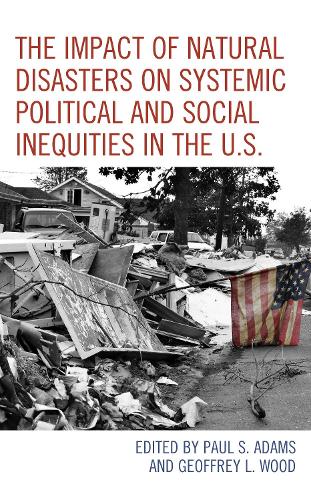
The Impact of Natural Disasters on Systemic Political and Social Inequities in the U.S.
(Paperback)
Publishing Details
The Impact of Natural Disasters on Systemic Political and Social Inequities in the U.S.
By (Author) Paul S. Adams
Edited by Geoffrey L. Wood
Contributions by Paul S. Adams
Contributions by Amlcar Antonio Barreto
Contributions by Dennis Feaster
Contributions by Timothy J. Holler
Contributions by Pamela Ray Koch
Contributions by Rene D. Lamphere
Contributions by Peter Loebach
Contributions by Ariane Prohaska
Bloomsbury Publishing PLC
Lexington Books
6th May 2022
United States
Classifications
Professional and Scholarly
Non Fiction
Social classes
363.3440973
Physical Properties
Paperback
160
Width 154mm, Height 219mm, Spine 12mm
245g
Description
The Impact of Natural Disasters on Systemic Political and Social Inequities in the U.S. examines how natural disasters impact social inequality in the United States. The contributors cover topics such as criminal justice, demographics, economics, history, political science, and sociology to show how effects of natural disasters vary by social and economic class in the United States. This volume studies social and political mechanisms in disaster response and relief that enable natural disasters to worsen inequalities in America and offers potential solutions.
Reviews
This collection of essays probes the economic, political, and social impacts of natural disasters in the US. The common thread throughout is a focus on social and political inequities, which are shown to be pervasive throughout the US. The contributors address inequities that appear in numerous areas, even those not often linked to natural disasters, such as voting, reintegration into society after incarceration, worthiness, and many more. At the root of these issues the reader finds the struggle for power, the importance of perception, and the necessity for capital of all stripes. The authors astutely argue that natural disasters create not only literal voids in space but also spaces in which ideologies flourish. By studying natural disasters from a variety of social scientific perspectives, this volume as a whole clearly demonstrates the scholarly need to examine complex issues from many different angles. Additionally, it not only makes a convincing case to build on the study of power and its linkages to natural disasters, it also implicitly makes the case that there is considerable work to be done on the study of power in society more generally. Recommended.
* Choice *The Impact of Natural Disasters on Systemic Political and Social Inequities in the U.S. is a critically important and timely interdisciplinary book that illuminates how disasters exacerbate inequality in America. More than other events, disasters highlight how wide the gap is between those with power and those without it. This book shows how disasters, and the failure to respond to them comprehensively, harms vulnerable populations. The contributors focus on how public policies following disasters provide cover for such things as voter suppression, voter disenfranchisement, and harsh treatment by the criminal justice system is just one of many reasons the book is a must read.
-- Lori Latrice Martin, Louisiana State UniversityIn the COVID-19 era this volume is timely, relevant, and powerful! It provides the intellectual tools as well as the experiential evidence of the nature of social inequality and how it impacts the haves and have nots in the midst of tragedy. Most refreshing about this volume is the use of two powerful yet distinct conceptual frameworks: the Critical Demography paradigm and the theory of historical categorical inequality. As the father of Critical Demography I am especially delighted at this unique and refreshing application of an idea that I introduced two decades ago! Im equally excited about the latter theory which is a special case of the classic socio-historical perspective. Together these theories provide a powerful new lens to analyze natural disasters as well as to inform public policy in the aftermath of the same. This volume will be an excellent addition to the literatures of sociology, political science, and public policy analysis! A major step forward! Bravo!
-- Hayward Derrick Horton, SUNY - AlbanyAuthor Bio
Paul S. Adams is associate professor of political science and chair of the Behavioral Sciences Division at the University of Pittsburgh at Greensburg.
Geoffrey L. Wood is associate professor of sociology and director of the Center for Applied Research at the University of Pittsburgh at Greensburg.
